Introduction
In the rapidly evolving landscape of automation, Robotic Process Automation (RPA) contracts emerge as a cornerstone for organizations seeking to harness the power of technology while mitigating risks. These agreements not only clarify the expectations and responsibilities of all parties involved but also serve as a safeguard against the uncertainties that accompany automation projects.
By establishing detailed frameworks that outline deliverables, timelines, and performance metrics, businesses can ensure that their RPA initiatives align seamlessly with operational goals. As organizations navigate the complexities of automation, understanding the intricacies of RPA contracts becomes essential for fostering accountability, driving efficiency, and ultimately achieving a robust return on investment.
This article delves into the critical elements of RPA contracts, the challenges they present, and best practices for negotiation, offering valuable insights for those committed to transforming their operations through automation.
Introduction to RPA Contracts: Definition and Importance
RPA contracts are formal documents that detail the terms and conditions for deploying Robotic Process Automation solutions within an organization. You only pay if we provide what was promised, reinforcing our commitment to risk-free ROI-driven services. These RPA contracts are crucial as they define the scope of work, responsibilities, and expectations for all parties involved, including vendors and clients.
The significance of RPA contracts lies in their ability to establish clear guidelines that help mitigate risks associated with automation projects. By clearly defining deliverables, timelines, and performance metrics, organizations can ensure that RPA implementations align with their operational goals and deliver the anticipated benefits. Furthermore, RPA contracts foster accountability and provide a framework for resolving disputes should they arise, making them an essential component of any successful RPA initiative.
Together, we will:
1. Assess a process of yours that you would like to automate,
2. Calculate the efforts required to automate the process,
3. Estimate the time savings you will achieve after the project and calculate the ROI, and
4. Automate the process, executed by a certified professional on our side.
Additionally, as shown in successful case studies, adopting GUI processes not only reduces manual workflow bottlenecks but also enhances productivity and operational efficiency.
With an emphasis on ROI, our risk-free solutions enable enterprises to utilize RPA effectively, fostering business growth through enhanced data-driven insights and optimized operations.
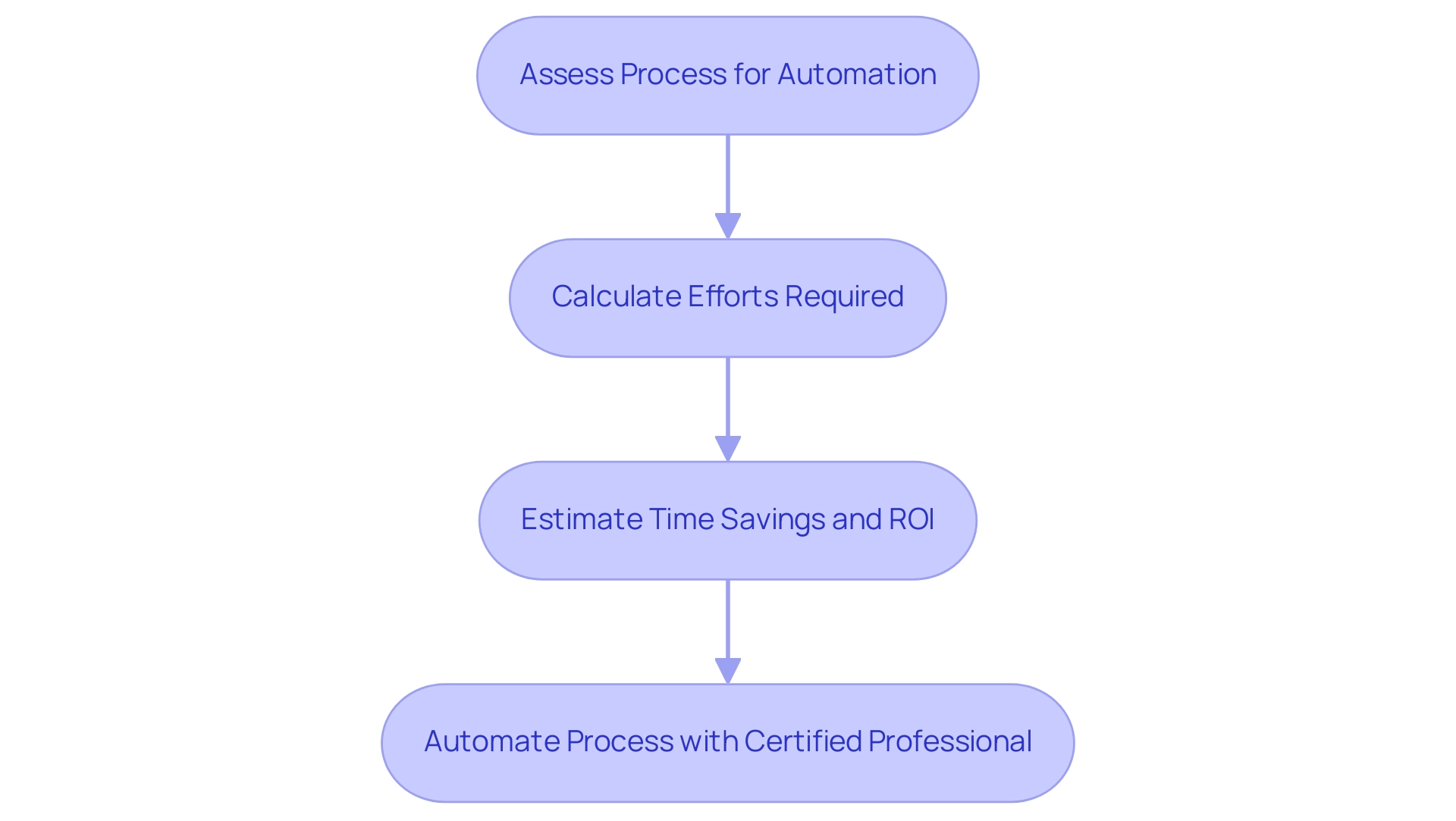
Understanding Arbitration in RPA Contracts: Binding vs. Non-Binding Decisions
Arbitration in RPA contracts acts as a mechanism for resolving disputes that may arise during the implementation of robotic process automation. With the rise of innovative tools like EMMA RPA and Microsoft Power Automate, it is essential for companies to address potential conflicts efficiently. RPA solutions tackle challenges such as task repetition fatigue and staffing shortages, which can hinder operational efficiency.
There are two primary types of arbitration:
- Binding arbitration
-
Binding arbitration means that the decision made by the arbitrator is final and enforceable by law, leaving no room for appeal. This is crucial for entities that prefer a definitive resolution to disputes without protracted litigation, especially when implementing transformative RPA solutions aimed at enhancing efficiency and employee morale.
-
Non-binding arbitration
- Conversely, non-binding arbitration allows for the option to pursue further legal action if one party is dissatisfied with the outcome. Recognizing these distinctions is crucial for companies when they negotiate RPA contracts. A well-defined arbitration clause in RPA contracts can save time and resources, ensuring that any disagreements are resolved efficiently, thus maintaining the momentum of automation projects.
By incorporating clear arbitration terms, entities can protect their interests and foster a collaborative environment, ultimately enhancing the success of their RPA initiatives and driving operational efficiency in a rapidly evolving AI landscape. To learn more about how our RPA solutions can benefit your organization, book a free consultation today.
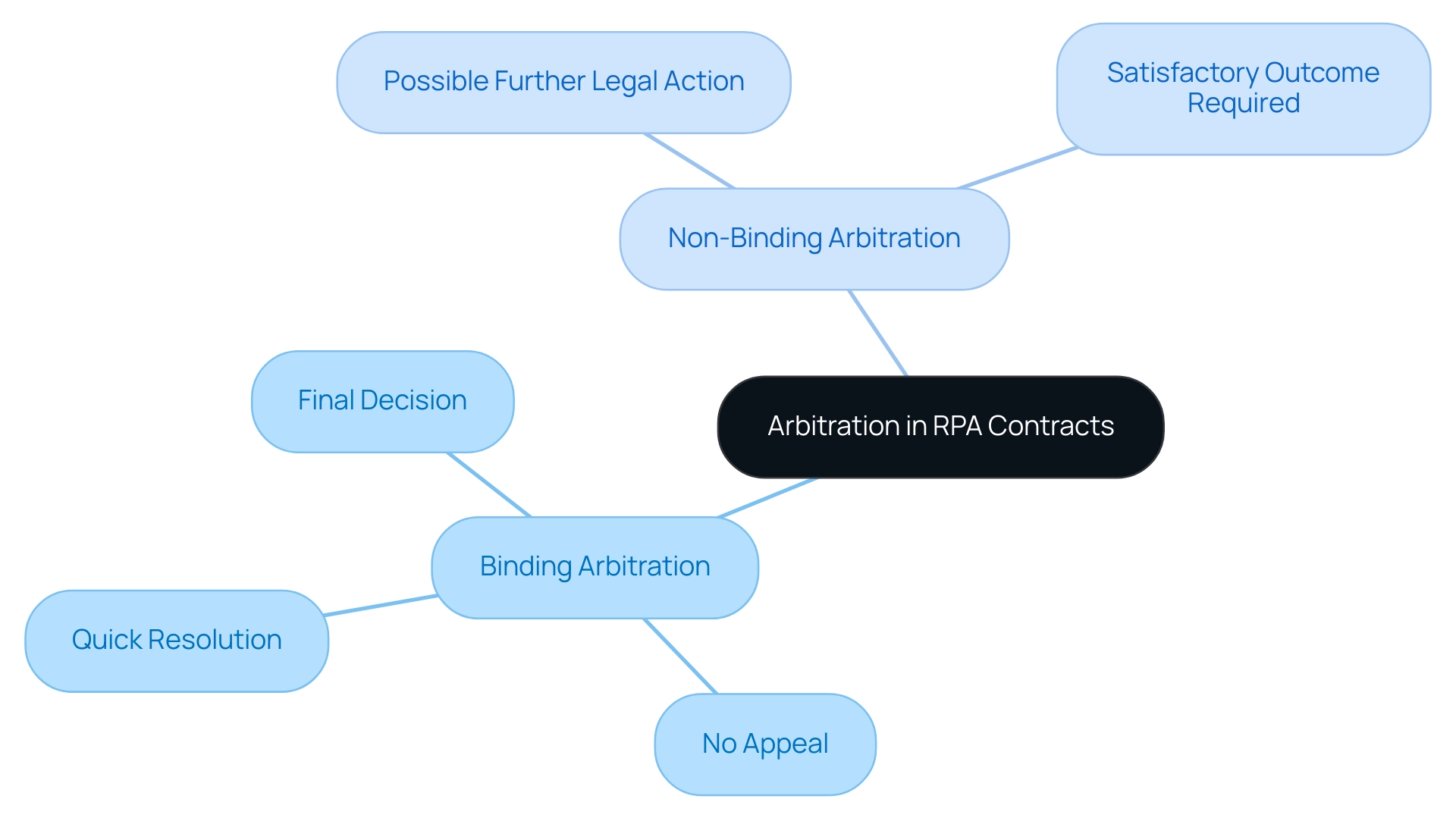
Key Elements of RPA Contracts: What to Include
Drafting effective RPA contracts requires careful consideration of several vital elements to ensure clarity and protection for all stakeholders. For instance, a direct-to-consumer retailer struggling with operational inefficiencies due to outdated systems can significantly benefit from well-structured RPA contracts. These RPA contracts should outline the scope of work, performance metrics, timelines, and payment terms, providing a clear structure for the automated process.
It’s crucial to define the roles and responsibilities of each party, including any third-party vendors, to foster accountability and collaboration. Moreover, safeguarding intellectual property rights connected to the mechanization processes is crucial to avoid future conflicts. Provisions for change management and termination clauses are also necessary to safeguard against unforeseen circumstances during implementation.
By integrating these essential components, entities can establish strong RPA contracts that facilitate successful initiatives while mitigating risks. For example, the case study ‘Streamlining Operations with GUI Automation’ highlights how a mid-sized company improved efficiency by automating repetitive tasks, which reduced data entry errors by 70% and accelerated testing processes by 50%. RPA solutions can also alleviate staffing shortages by automating mundane tasks, allowing employees to focus on higher-value work, which in turn aids in talent retention.
As Alan Hester, President of Nividous, aptly states, ‘Embracing RPA transcends being merely a choice; it represents a strategic move toward a future characterized by agility, efficiency, and innovation.’ This strategic foresight is particularly relevant for retailers and other organizations facing operational challenges, empowering them to navigate obstacles effectively and enhance overall productivity through RPA solutions.
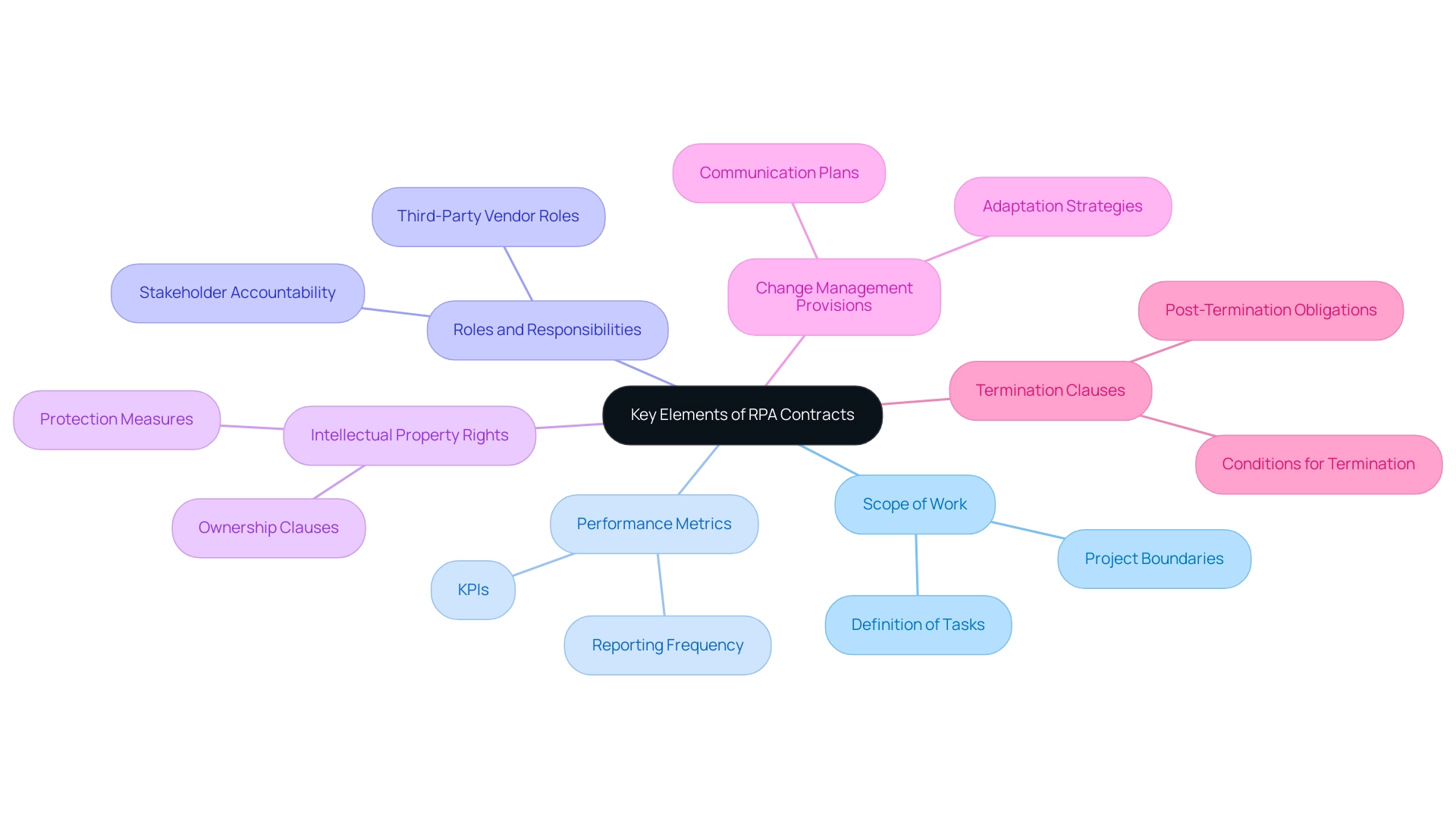
Challenges and Risks Associated with RPA Contracts
RPA contracts play a crucial role in the success of automated initiatives, yet they present challenges that necessitate careful navigation. A prominent concern is scope creep, where project requirements can expand uncontrollably beyond the initial agreement, leading to inflated costs and delays. This is a significant issue, as studies show that 70% of automation projects face scope management challenges.
Additionally, aligning stakeholder expectations can be difficult, often resulting in friction that hampers progress. Concerns about job displacement may also lead to employee resistance, complicating the implementation of new technologies. Alan Hester, President of Nividous, emphasizes this, stating,
Embracing RPA transcends being merely a choice; it represents a strategic move toward a future characterized by agility, efficiency, and innovation.
For instance, a high-tech manufacturer achieved annual savings exceeding $90,000 by automating over 20 business processes, showcasing the advantages of effective RPA management. To mitigate the risks associated with scope creep in RPA contracts, organizations should prioritize establishing clear communication channels and robust change management strategies. Regular reviews and updates to the RPA contracts are essential to accommodate evolving needs and prevent misunderstandings, ensuring that the automation journey remains aligned with initial objectives.
Furthermore, integrating tailored AI solutions with RPA can significantly enhance operational efficiency by addressing specific business challenges and providing deeper insights. A leading conglomerate faced challenges in configuring security devices and troubleshooting alerts through manual processes. By leveraging RPA alongside Business Intelligence tools, they not only automated these tasks but also extracted actionable insights from data, demonstrating the real-world impact of addressing RPA agreement challenges.
By proactively tackling these issues and utilizing a combination of RPA, tailored AI solutions, and Business Intelligence, businesses can harness the full potential of RPA, transforming operational efficiency and driving productivity forward.
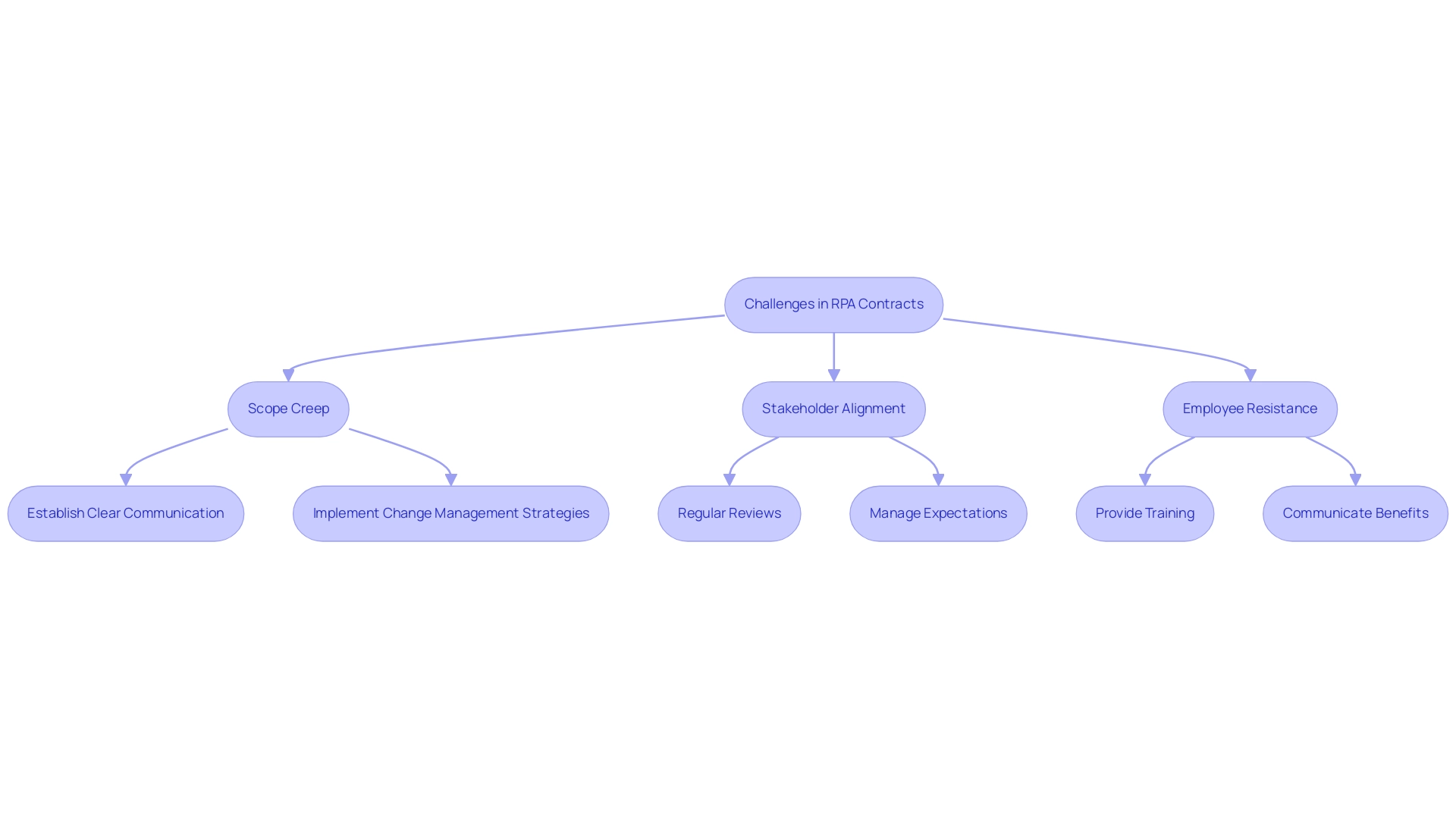
Best Practices for Negotiating RPA Contracts
Negotiating RPA contracts requires careful consideration and strategic planning in the context of enhancing operational efficiency and productivity. Organizations should begin by conducting thorough research on potential vendors, understanding their capabilities and past performance. It’s essential to establish clear goals and expectations that align with the broader objectives of automating manual workflows and enhancing productivity through RPA, which can lead to significant cost reductions.
During negotiations, entities should advocate for favorable terms that support these goals, including:
– Performance guarantees
– Flexible change management provisions
Additionally, leveraging Business Intelligence is crucial, as it can transform data into actionable insights that inform negotiation strategies and decision-making. Seeking legal advice to review agreement terms and ensure adherence to relevant regulations is also essential.
By following these best practices and integrating insights from tailored AI solutions and Business Intelligence, organizations can secure RPA contracts that effectively bolster their RPA initiatives and drive significant operational improvements while overcoming challenges in the rapidly evolving AI landscape.
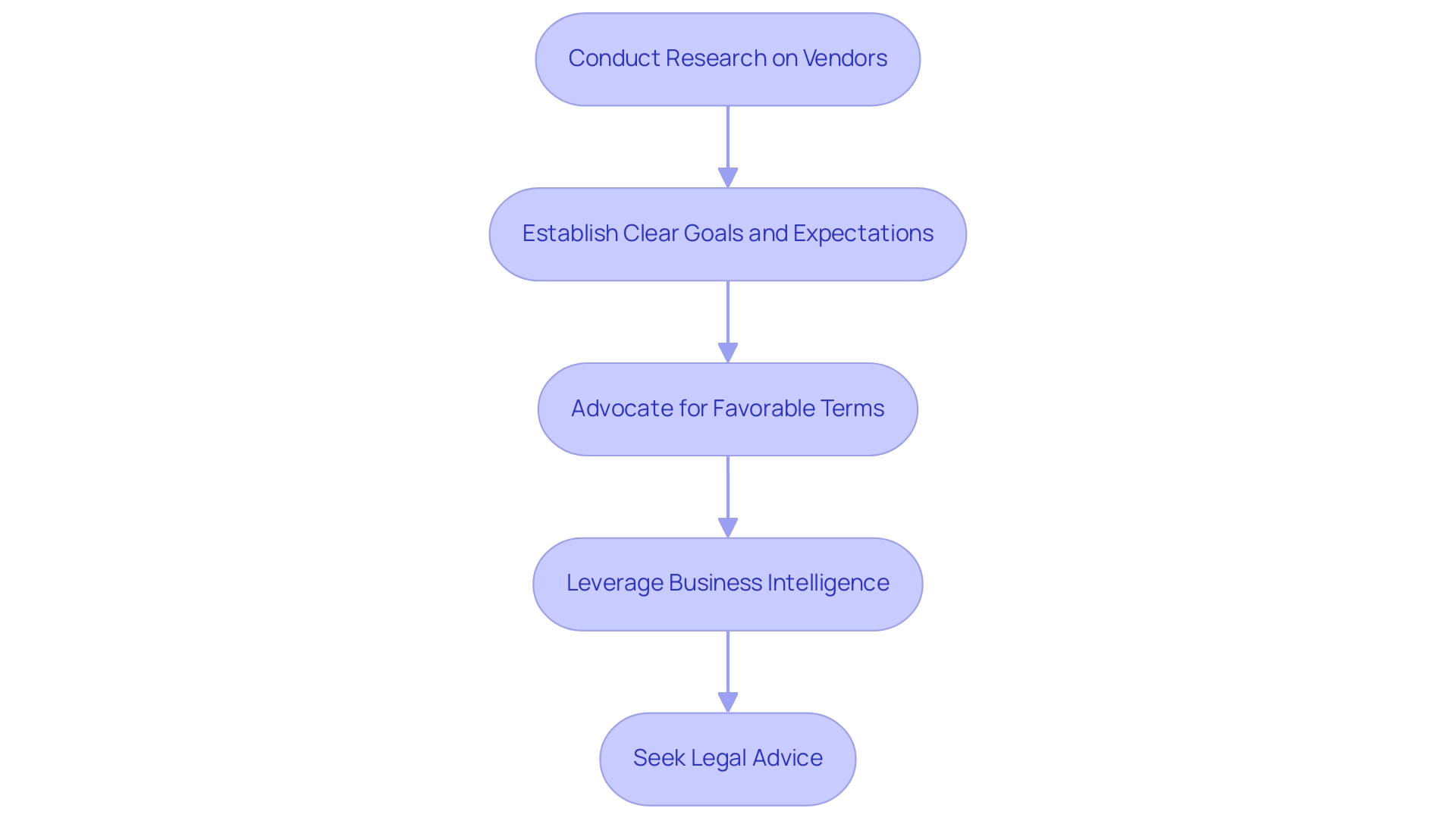
Conclusion
Robotic Process Automation (RPA) contracts are not merely bureaucratic documents; they are foundational elements that can make or break an automation initiative. By clearly defining the scope of work, responsibilities, and performance metrics, organizations can mitigate risks and ensure that automation projects align with operational goals. The significance of these contracts lies in their ability to foster accountability and provide a structured approach to resolving disputes, ultimately paving the way for successful implementations.
Navigating the complexities of RPA contracts requires a keen understanding of potential challenges, such as scope creep and stakeholder alignment. Organizations that proactively address these issues by establishing effective communication and change management strategies can safeguard their automation investments. Incorporating essential elements into RPA contracts, such as intellectual property rights and termination clauses, further enhances protection and clarity for all parties involved.
Best practices in negotiating RPA contracts emphasize the importance of research, clear goal-setting, and leveraging insights from Business Intelligence. By advocating for terms that support an organization’s broader objectives and seeking legal counsel, businesses can secure agreements that not only protect their interests but also drive operational efficiency. As organizations embrace RPA, the focus should remain on transforming challenges into opportunities for growth, ultimately leading to improved productivity and innovation in a competitive landscape.

